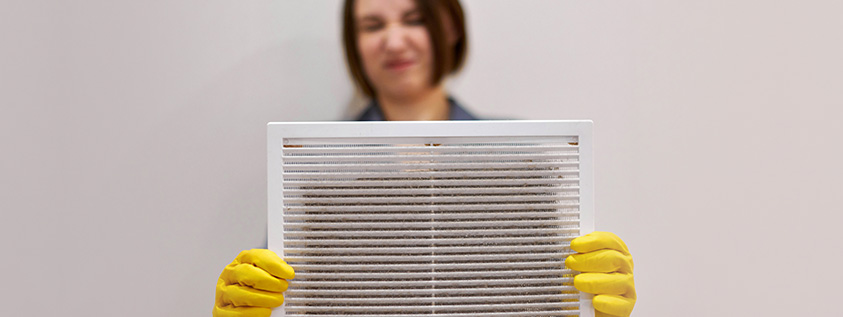Is mold in your HVAC systems bad for you?
Yes and no. Mold is always present in your buildings and your HVAC systems to the extent that it is present in your building’s environment. There will be more mold in humid weather and less in dry weather. You will never get rid of it completely, but you can control it. Mold needs three things to grow. Warmth, moisture, and food – take those away, and the mold goes away.
When mold, especially types of molds like aspergillus Niger, or black mold, overwhelms systems, air quality can be dangerous. Those with sensitivities to mold can immediately become affected, with respiratory issues presenting immediately. Others, with little or no sensitivity, may notice odors or become more sensitive. If really bad, you will notice that mold spreads to other surfaces.
Signs of Mold in HVAC Systems
Since mold spores are virtually invisible to the naked eye, how can you spot mold growth in your HVAC system? Severe mold infestations are usually easy to spot. In cases where mold has been left unattended, you can spot speckles on air registers and vents. Another tell-tale sign that mold is living rent-free in your home is the odor. If you are experiencing a particularly funky smell, it could mean you’ve got some new moldy neighbors — think wet dog with a touch of old cheese. HVAC specialists are no strangers to mold, and they will know what’s what when it comes to your system’s mold issues. So if you are on the lookout for mold, Sterling HVAC specialists Cardinal Plumbing, Cooling and Heating are here to help.

Prevent Mold Growth in Ductwork
Insulating the Ducts
Ducts run through all uninsulated areas of the home and get affected by cold air surrounding them. Condensation tends to build up when circulating warm air from inside the home comes into contact with a cold metal duct. The condensation remains in the ductwork and becomes a breeding ground for mold and mildew.
Inspecting the Ducts
You should have the ductwork professionally inspected at least once each year or with every preventative maintenance. Licensed and experienced air conditioner technicians will be able to identify malfunctions and duct leaks in the system which may cause moisture in the ductwork. Air surrounding the ductwork tends to have higher humidity levels since it is typically unconditioned.

